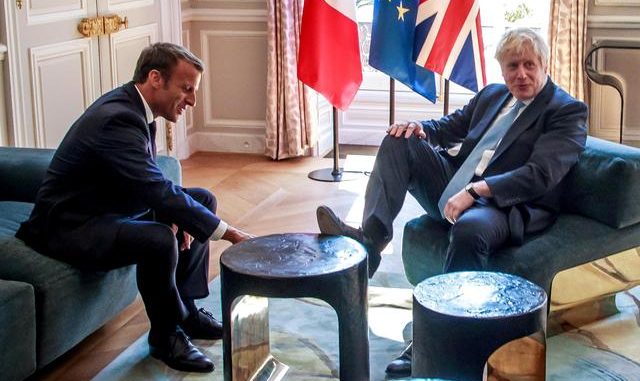
French President Emmanuel Macron told Prime Minister Boris Johnson on Thursday that there was not enough time to wholly rewrite Britain’s Brexit divorce deal before an Oct. 31 deadline.
Johnson met Macron at the Elysee Palace a day after talks in Berlin with German Chancellor Angela Merkel, who challenged Britain to come up with acceptable alternatives to the agreed safety net provision for the UK-Irish land border.
More than three years after the United Kingdom voted to quit the European Union, it is still unclear on what terms – or indeed whether – the bloc’s second largest economy will leave the club it joined in 1973.
RELATED COVERAGE
- Boris Johnson puts his feet up in Macron’s palace
- Explainer: What is the Brexit backstop alternative paper Johnson praised?
See more stories
Talks over lunch were constructive, a French official said.
Macron left the door open to Britain seeking a solution to the Irish “backstop”, but said any alternative must respect both the integrity of the EU single market and stability on the divided island of Ireland.
“I want to be very clear,” he said. “In the month ahead, we will not find a new withdrawal agreement that deviates far from the original.”
On his first trip abroad since entering 10 Downing Street a month ago, Johnson has warned Merkel and Macron that they face a potentially disorderly no-deal Brexit on Oct. 31 unless the EU does a new deal.
Speaking in The Hague, Merkel said she had not meant to set a deadline when saying on Wednesday that a solution to the Irish border issue could be found within 30 days, but to “highlight the urgency”.
The British pound, sensitive to the prospect of a ‘no-deal’ exit, rose 1% against both the dollar GBP=D3 and the euro GBPEUR= on her comments. [GBP/]French President Emmanuel Macron and British Prime Minister Boris Johnson speak during a meeting at the Elysee Palace in Paris, France, August 22, 2019. Christophe Petit Tesson/Pool via REUTERS
“LET’S GET BREXIT DONE”
Johnson told Macron that he believed it was possible to agree a deal before Oct. 31, and that he had been “powerfully encouraged” by what he had heard from Merkel on Wednesday.
“Let’s get Brexit done, let’s get it done sensibly and pragmatically and in the interests of both sides and let’s not wait until October 31,” Johnson said. “Let’s get on now in deepening and intensifying the friendship and partnership between us.”
Johnson, an ardent Brexiteer, is betting that the threat of ‘no-deal’ Brexit turmoil will convince Merkel and Macron that the EU should do a last-minute deal to suit his demands. He has repeated promises to leave on Oct. 31 – with or without a deal.
Macron insisted Britain’s destiny lay in Johnson’s hands alone. He said the EU did not want a ‘no-deal’ scenario, but would be ready if it happened.
The political crisis in London over Brexit has left allies and investors puzzled by a country that for decades seemed a confident pillar of Western economic and political stability.
Many investors say a ‘no-deal’ Brexit would hurt the economies of Britain, the EU and the wider world, roil financial markets and weaken London’s position as the pre-eminent international financial centre.
Macron said that any new solution to the problem of the Irish border had to be found in the next month.
Signalling that the ball was in the UK’s court, he said: “If we cannot find alternatives, then it will be because of a deeper problem, a political one, a British political problem.Slideshow (6 Images)
“And for that, negotiations can’t help. It will be up to the prime minister to make that choice, it won’t be up to us.”
IRISH BORDER
After Brexit, the frontier between Ireland and the UK province of Northern Ireland will be the only land border between the EU’s single market and Britain.
The EU wants to ensure that it does not become a back door for goods to enter the single market – which guarantees free movement of goods, capital, services and labour.
Ireland for its part says physical checks could undermine the 1998 Good Friday agreement, which brought peace to Northern Ireland after more than 3,600 died in a three-decade conflict between unionists who wanted the province to remain British and Irish nationalists who want it to join a united Ireland ruled from Dublin.
The backstop, negotiated by Johnson’s predecessor Theresa May, provides for Britain to remain in a temporary customs union with the EU after Brexit, avoiding the need for any ‘hard’ border infrastructure, until a better solution is found.
But Johnson said in Paris: “Under no circumstances will the UK government be instituting, imposing, checks or controls of any kind at that border. We think there are ways of protecting the integrity of the single market and allowing the UK to exit from the EU.”
Brexit supporters acknowledge that there may be short-term disruption from a ‘no-deal’ exit but say the UK will thrive if cut free from what they cast as a doomed experiment in integration that has led Europe to fall behind China and the United States.
Additional reporting by Richard Lough in Paris and Gabriela Baczynska in Brussels; Writing by Richard Lough and Guy Faulconbridge; Editing by William Maclean, Raissa Kasolowsky and Kevin Liffey
PARIS (Reuters) –
